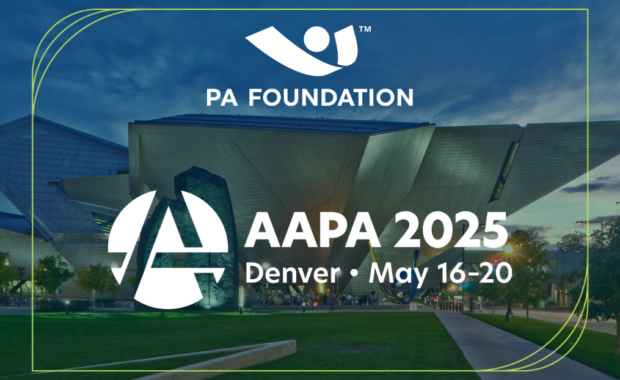Inspired by the Outdoors? Check Out Wilderness Medicine
Special Interest Group Offers Advice and Mentorship
June 5, 2024
By Kate Maloney
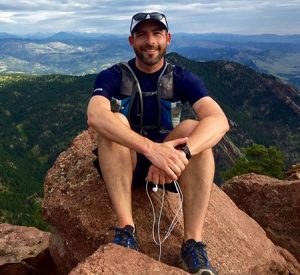 David Braun, PA-C, grew up in Wisconsin, where he spent a lot of time outdoors. “The outdoors feels immediate and real,” Braun says. “The wilderness is its own space on its own terms. There isn’t anything artificial; it’s an objective place to experience. I’ve learned about who I am being in the wilderness – confronting challenges, enjoying the beauty of it.”
David Braun, PA-C, grew up in Wisconsin, where he spent a lot of time outdoors. “The outdoors feels immediate and real,” Braun says. “The wilderness is its own space on its own terms. There isn’t anything artificial; it’s an objective place to experience. I’ve learned about who I am being in the wilderness – confronting challenges, enjoying the beauty of it.”
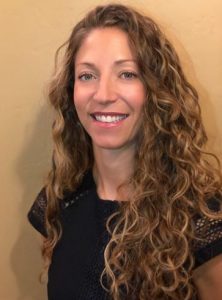 Angela Widler, PA-C, a fellow outdoor enthusiast, shares his sentiments: “Rarely am I more aligned with myself than when I’m active in the wilderness,” she says.
Angela Widler, PA-C, a fellow outdoor enthusiast, shares his sentiments: “Rarely am I more aligned with myself than when I’m active in the wilderness,” she says.
A Passion for the Outdoors
Braun hiked and skied and camped, and his interest in the wilderness grew as he did. After college, he moved to Colorado, where he worked at an outdoor non-profit. He quickly realized that a desk job was not for him and considered the PA career. It offered both the clinical environment he was looking for, as well as a flexible schedule for him to continue his leisure and volunteer outdoor activities. He left Colorado briefly to attend PA school at the University of Washington but returned as soon as he could.
[Skis, Not Scrubs: PAs Serve Patients on the Slopes]
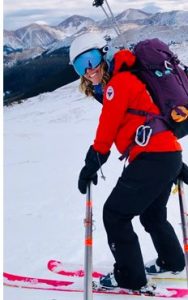
Widler believes strongly that being active in the outdoors is an important part of overall well-being. “The wilderness is a place for me to push myself physically and mentally, while cultivating a profound appreciation for the beauty of life and my surroundings in each moment,” she says. “One of my favorite parts of the outdoor community is connecting with like-minded people and the opportunity for new friends and adventures.”
PAs and Search and Rescue Volunteers
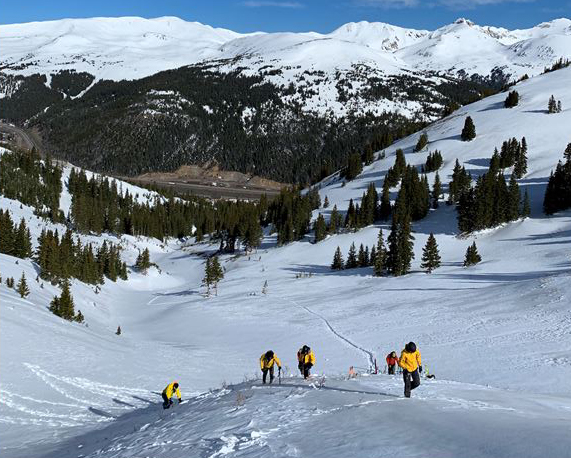 Braun and Widler now work as PAs in the Denver area and volunteer with a search and rescue team in Evergreen, CO. They, along with 80 other community volunteers, receive a page when individuals or groups of people are in distress in the wilderness; they respond to avalanches, fallen climbers, weekend hikers who are lost. Based just outside of Denver, the group covers a large area, which includes several 14,000-foot mountains. “With amazing outdoor opportunities and a high-population city…we get a lot of calls,” Braun says. Whoever is available responds to the situation. “You have to be ready for the whole spectrum. The wilderness setting is totally unpredictable. We encounter folks who don’t plan properly, but we also encounter others who are tremendously experienced. You never know who is going to need help.”
Braun and Widler now work as PAs in the Denver area and volunteer with a search and rescue team in Evergreen, CO. They, along with 80 other community volunteers, receive a page when individuals or groups of people are in distress in the wilderness; they respond to avalanches, fallen climbers, weekend hikers who are lost. Based just outside of Denver, the group covers a large area, which includes several 14,000-foot mountains. “With amazing outdoor opportunities and a high-population city…we get a lot of calls,” Braun says. Whoever is available responds to the situation. “You have to be ready for the whole spectrum. The wilderness setting is totally unpredictable. We encounter folks who don’t plan properly, but we also encounter others who are tremendously experienced. You never know who is going to need help.”
PAs in Wilderness Medicine
Braun and Widler, both passionate about wilderness medicine, co-founded the PAs in Wilderness Medicine special interest group. Their goal with PAs in Wilderness Medicine is to increase awareness of all types of wilderness medicine and increase the number of professional opportunities for PAs in the field. Wilderness medicine is closely related to a few other fields: remote-site medicine, tactical medicine, and disaster medicine. “If there are PAs who are interested in working in Antarctica, or on an oil rig in the ocean, or as a raft guide, or for the national parks, we want to expose them to the opportunities that are out there. We want to create a network and reach out to PAs, PA students, early-career PAs, or second-career PAs,” Braun says.
[How PAs Can Use Their Skills in Disaster Medicine]
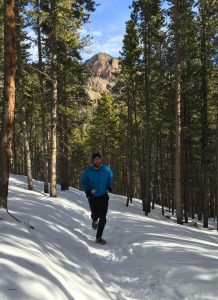
If you’re looking to get involved with wilderness medicine, Widler suggests engaging in volunteer work for local wilderness medicine outfits, while actively pursuing opportunities to enhance your knowledge base and expertise. “Some local search and rescue groups allow non-members to attend certain trainings in addition to offering public courses, and that’s an excellent opportunity to learn, practice, or expand upon many outdoors skills.” She also advocates strongly for spending lots of time outdoors!
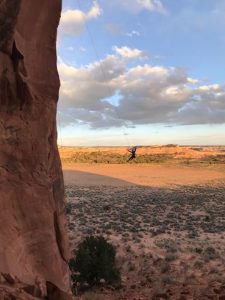 Braun and Widler both hope interested PAs will reach out to the PAs in Wilderness Medicine special interest group. “We can help you get exposure to education and experience,” he says. “Wilderness medicine PAs can make a big difference. Just last month, a person got lost in the mountains outside of Denver. They thought they were going to die. The search and rescue team volunteers came out, spent hours getting to them in the dark February night, and that person survived. We make big impacts in people’s lives, and it’s incredibly rewarding.”
Braun and Widler both hope interested PAs will reach out to the PAs in Wilderness Medicine special interest group. “We can help you get exposure to education and experience,” he says. “Wilderness medicine PAs can make a big difference. Just last month, a person got lost in the mountains outside of Denver. They thought they were going to die. The search and rescue team volunteers came out, spent hours getting to them in the dark February night, and that person survived. We make big impacts in people’s lives, and it’s incredibly rewarding.”
For additional information about learning, volunteer and career opportunities in wilderness and remote medicine, visit My PA Network.
David Braun, PA-C, and Angela Widler, PA-C, both have extensive experience in the emergency and acute care settings and are co-founders of the PAs in Wilderness Medicine special interest group. Braun can be reached at [email protected]. Widler can be reached at [email protected].
Kate Maloney is AAPA’s senior manager of corporate communications. She can be reached at [email protected].
Editor’s Note: This article was originally published in March 2020.
You May Also Like
PA Julie Mueller Thrives in Remote Antarctica
Running Over Barriers: Ultrarunner PA Competes After Amputation
How to Help Provide Emergency Disaster Services
Thank you for reading AAPA’s News Central
You have 2 articles left this month. Create a free account to read more stories, or become a member for more access to exclusive benefits! Already have an account? Log in.
